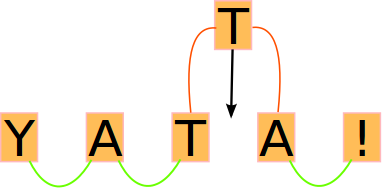A real-time web framework that manages concurrency control for arbitrary data structures. Yatta! provides similar functionality as ShareJs and OpenCoweb but does not require you to understand how the internals work. The predefined data structures provide a simple API to access your shared data structures.
Predefined data structures:
- Text - Collaborative Text Editing Example and example code
- Json - example code
- XML (coming soon)
Unlike other frameworks, Yatta! supports P2P message propagation and is not bound to a specific communication protocol.
Currently supported communication protocols:
Use it!
Either clone this git repository or install this package with bower.
bower install Yatta
Use the examples to struggle your way through this mess..
About
Find out more about the concurrent editing problem here Cooperation, Concurrency, Conflicts, and Convergence and here Operational Transformation (OT)
My Bachelor Thesis project aim was to develop a P2P OT Framework that enables collaboration on XML documents and supports Intention Preservation. After some time I realized that OT has significant drawbacks in P2P environments.
With my gained experiences I came up with a new approach. I named it Yata - Yet Another Transformation Approach. It enables concurrent editing with the following space and time properties:
- Time complexity: O(S), whereby S is the number of operations that are inserted concurrently at the same position (no transformation against operations that happen on different positions).
- Space complexity = O(|Document|), whereby |Document| is the size of the shared document.
This means that my approach beats all OT time complexities. Furthermore, Yatta has a very strict definition of Intention Preservation, and I was able to show that it is never violated.
Another advantage of Yata is that propagated messages are very small. Background: In real-time P2P OT algorithms you have to send a state-vector with each message that defines the state of the History Buffer on which the operation was created. This is not necessary in Yata.
The downside of this approach is that the History Buffer holds at least as many operations as there are characters in the document. In contrast, an OT algorithm can have an empty History Buffer while the document size is very big.
Eventually (after my thesis), I will publish more information about Yata.
So, how did I come up with the name for the implementation (Yatta! is not Yata)? Yatta! means "I did it!" in Japanese. You scream it when you accomplish something (for proper application I refer to the Yatta-man in Heroes). There is also this awesome video on the Internet that will change your life Yatta.
Status
Yatta! is still in an early development phase. Don't expect that everything is working fine. But I would become really motivated if you give me some feedback (github or mail).
Current Issues
- Garbage Collection
- XML support
Support
Please report any issues to the Github issue page!
License
Yatta! is licensed under the MIT License. kevin.jahns@rwth-aachen.de
